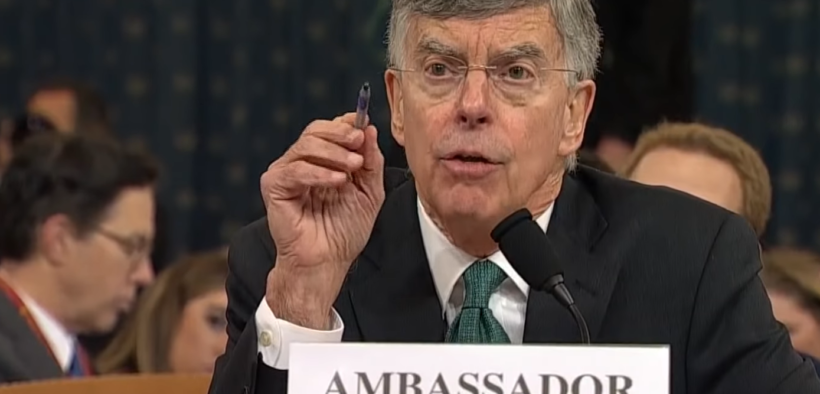Impeachment Update: What Happened on the First Day Of Public Impeachment Hearings

Republicans got their wish on Wednesday with the first day of public impeachment hearings, a day some described as devastating while others tried to dismiss as inconsequential.
The first public impeachment hearing in two decades saw acting ambassador to Ukraine William Taylor and deputy assistant secretary of State for European and Eurasian affairs George Kent testify before the House for over five hours on the Trump administration’s alleged efforts to use foreign aid as leverage to force an investigation of the president’s political rival.
Beyond a public recitation of the accounts both career diplomats – who have more than 70 years of public service between them – had previously given, Amb. William Taylor offered a new claim in his testimony that some observers described as “absolutely devastating:”
“In the presence of my staff at a restaurant, Ambassador Sondland called President Trump and told him of his meetings in Kyiv,” Taylor said during his opening remarks. “The member of my staff could hear President Trump on the phone, asking Ambassador Sondland about ‘the investigations.’ Ambassador Sondland told President Trump that the Ukrainians were ready to move forward.”
Taylor said his staffer asked Sondland after the call “what President Trump thought about Ukraine.”
“Ambassador Sondland responded that President Trump cares more about the investigations of Biden, which [Trump’s personal attorney Rudy] Giuliani was pressing for,” Taylor said.
Taylor and Kent reiterated their earlier claims that the Trump administration sought to withhold $391 million in security assistance from Ukraine in order to pressure the country’s government to open a publicized investigation into Joe Biden’s son’s involvement with Ukrainian natural gas company Burisma. The administration only released the aid after the whistleblower’s complaint in August.
Republicans Go On The Offensive During Impeachment Hearings
Rep. Jim Jordan, a fierce Trump ally who was moved to the House Intelligence Committee for the public hearings, led the offensive during the inquiry. Jordan and other GOP Reps highlighted the lack of direct communication between Trump and the diplomats as evidence that their testimonies were invalid. “And you’re their star witness,” Jordan said to Taylor.
“The first 2 ‘star’ witnesses in this impeachment sham have never even spoken to @POTUS,” tweeted Stephanie Grisham. “Think about that: in a Presidential impeachment hearing, the dems witnesses have never even spoken w President Trump. This country deserves so much better.”
However, critics note that the people who have spoken to Trump about the situation have all been ordered not to testify, including Mulvaney and Bolton.
“I’m not sure the House GOP has really thought through this argument they’re making that, in order to get to the heart of this scandal, we’d *really* need to hear from the people in Trump’s inner circle who are refusing to testify,” tweeted historian Kevin Cruse.
While the House Republicans’ impeachment hearing strategy has focused on dismissing the severity of the allegations and discrediting the witnesses, Senate Republicans appear to be developing a deeper plan. According to the Washington Post, McConnell and other GOP Senators want to draw out the impeachment hearings in order to hamper the presidential campaigns of frontrunners Sen. Bernie Sanders and Sen. Elizabeth Warren, who will be forced off the campaign trail for weeks to oversee the inquiry.
Is The Impeachment Hearing and Overall Inquiry Too Narrow?
The House Democratic leadership believes that maintaining a narrow focus on the president’s solicitation of a foreign power in the coming election is the best strategy for impeachment, critics argue the inquiry should include his more serious offenses.
“Regardless of what today’s impeachment hearings result in, it’ll always frustrate me that the Democrats in the House impeached Trump over Ukraine, Joe Biden and military aid, and not over the theft and caging of thousands of brown children,” tweeted the Intercept’s Mehdi Hasan.
In a twitter thread, Foreign Policy’s David Rothkopf expanded on some of the issues that could be brought forward in a more thorough inquiry:
“1. We know he lied under oath to Mueller 2. We know he violated both the foreign and domestic emoluments clauses of the Constitution 3. We know he violated FEC rules (per the Cohen case) 4. We know he obstructed justice many times (per Mueller)
5. We know he failed to cooperate with subpoenas from the Congress 6. We know he violated the law requiring him to turn over his taxes to the Congress. These are all clear cut cases where there are mountains of proof and where prosecution of anyone else would take place.
There are, of course, many other cases of abuses of Congress, lying, potential tax fraud, serial abuse of women, commission of human rights abuses at our border, conspiracy w/a foreign enemy to attack our elections, abuse of power, negligence or worse in the case of Puerto Rico.”
Alan Hirsch, a legal expert and author of Impeaching the President: Past, Present, Future, describes himself as an “impeachment skeptic,” positing that the last-resort method is “inappropriate in president’s first term.” But while Hirsch argued against an impeachment hearing last year, he now believes that the raw volume of the president’s impeachable offenses, in addition to his efforts to enlist a foreign power’s help in the coming election, make him deserving of impeachment.
“When a president continually engages in inappropriate behavior to win an election, the election itself ceases to be a reliable way of removing him,” wrote Hirsch. “When a rotten administration repeatedly seeks to gain an improper advantage at the ballot box, it no longer makes sense to regard the ballot box as the only means of removing the president from office.”









